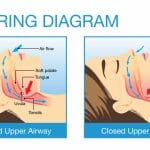Sleep is critical to the normal and healthy function of a human’s life. Unfortunately, some disorders can disrupt the ability to get restful sleep, either in quality or quantity. One disorder that doesn’t get a lot of attention is SRED, or sleep related eating disorder. This is a condition where, during the period when the body is moving from being awake into non-REM sleep, the mind can remain active enough to engage in a very specific kind of sleepwalking behavior.
Normal sleepwalking is simply when someone who is asleep will move around, unaware of the fact that they’re active and not resting quietly. SRED takes this same behavior, and adds an uncontrollable urge to binge eat. The sleepwalker will seek out foods, normally calorie dense foods, and consume them. All while their mind is still asleep. Like most sleepwalkers, the individual will not remember what they’ve done; even if shown evidence of their activities.
The cause and reason for occurrence of SRED is not yet understood, but sleep pathologists speculate stress, lifestyle factors, and anyone who’s already prone to more routine forms of sleepwalking is at risk for SRED incidents. Treatment focuses on these lifestyle risk factors, seeking to minimize or eliminate them in the hopes of stopping future SRED incidents.
Sleep disorders come in a variety of forms. Even sleepwalking can be more than just walking. #HealthStatus
Follow HealthStatus
Tweet Now
Key Points:
- 1One study suggests that 5% of the population suffers from an eating disorder that occurs when sufferers wake up from a short-wave, or NREM sleep.
- 2As is common with sleep-walking sufferers, SRED suffers experience amnesia of the actual event.
- 3The disorder is characterized by dysfunctional eating and drinking while sleeping.
See the original at: https://psychcentral.com/lib/sleep-related-eating-disorder-causes-treatment-and-more/








Reply